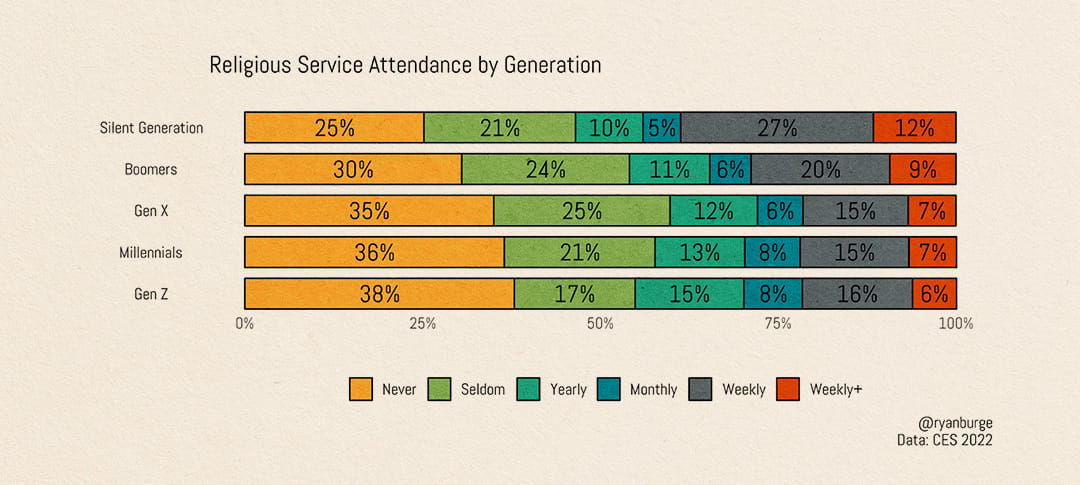Hey, it’s Brady,
Gen Z are those born between 1996 and 2010. Another label for this generation? Zoomers.
Here’s what your church needs to know about them…
#1. Gen Z is the least religious generation in American history.
(thanks to @ryanburge for the data and graphs in this post)

#2. Gen Z is becoming less religiously identified as each year passes.
As are Millennials, Boomers, and Gen X.

To quote Ryan Burge in 2022:
"It seems statistically justifiable to say that by the time the United States has another presidential election, half of Generation Z will identify as atheist, agnostic, or nothing in particular."
Interestingly, beliefs differ from involvement. Because it’s Gen X that is in fact the least active religious generation. Both Millennials and Gen Z attend church more frequently than Gen X.

What might this mean?
To quote Burge again:
“Many of Gen X are reaching their peak in personal income and are being tapped to be leaders in all aspects of society. Yet, they are clearly not filling the churches, synagogues, and mosques each weekend. That could open the door for Millennials and Gen Z to step up sooner for leadership roles.”
5 Stats About Gen Z I’m Looking At 👀
#1. Gen Z spends 24-48 hours per month on TikTok [Source: Hootsuite 2022 Trends Report]
The percentage of Gen Z’s online time being spent on social media is at an all-time high of 41%. This is likely because social media is being used for different reasons now - it’s no longer just about following friends, family, or even influencers.
☝️ This is important. As *what* we use social media for becomes bigger, we spend even more time on these platforms.
#2. Gen Z is more likely than other generations to report having a mental health condition and almost 3 in 10 say they’re prone to anxiety, a higher proportion than any other age group [Source: Global Web Index]
Might this be what some doctors are calling Prevalence Inflation?
The peer-reviewed scientific journal New Ideas In Psychology published the following thesis: "First, we argue that mental health awareness efforts are leading to more accurate reporting of previously under-recognised symptoms, a beneficial outcome. Second, and more problematically, we propose that awareness efforts are leading some individuals to interpret and report milder forms of distress as mental health problems. We propose that this then leads some individuals to experience a genuine increase in symptoms, because labelling distress as a mental health problem can affect an individual's self-concept and behaviour in a way that is ultimately self-fulfilling."
Read that again in case you missed it 👆
See the full article here
#3. 98% of Gen Z worldwide own a smartphone with the highest percentage of online users owning a smartphone occurring in Africa and the Middle East [Source: Global Web Index]
#4. Gen Z is on track to be the best-educated generation yet [Source: Pew Research]
Gen Z’s are also more likely to have a college-educated parent than previous generations of young people in America
For example, In 2019, 44% of Gen Zers ages 7 to 17 were living with a parent who had a bachelor’s degree or more education, compared with 33% of Millennials when they were the same age.
#5. Gen Z is more racially and ethnically diverse than previous generations [Source: Pew Research]
In America, 22% of Gen Zers have at least one immigrant parent (compared with 14% of Millennials)
According to Census Bureau projections, Gen Z is projected to become majority nonwhite in America by 2026
What might this mean for the future of Christianity in America? If you’re an advocate for abortion bans, it may be a good thing. Hispanics are 33% more likely to favor a ban on abortion than white Americans. And African-Americans are 17% more likely.
The Mystery Woman Behind Your Favorite Church Brands
What if I told you that there was one person behind many of the most influential church brands in the world today.
We're talking contributions to VOUS Church, Maverick City, Tim Ross, TAYA, Tasha Cobbs Leonard. She's even worked with Kanye.
Her name is Katlyn Hovland and on this week’s podcast we ask her every big question you've ever had about church branding, typography, colors, logos, photography, and everything in between.
Thanks as always for your time, attention, and trust. Talk to you next Thursday. - Brady Shearer


